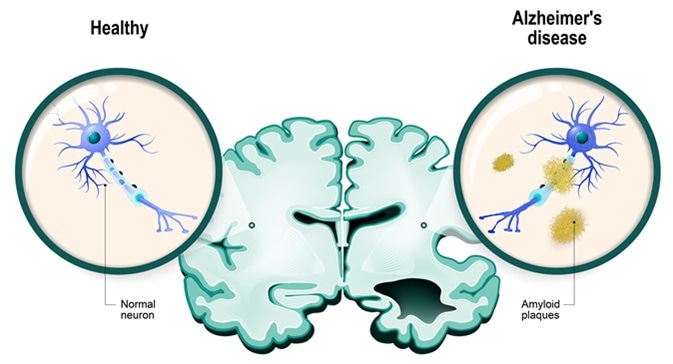Alzheimer's disease is a progressive condition causing neurodegeneration that results in memory loss, confusion, and overall deterioration of mental function.
Overview of Alzheimer's
The exact cause of the disorder is not yet established. However, several pieces of evidence show the involvement of genetic, lifestyle-related, and environmental factors. The focus in several ongoing studies involves how these factors interact and contribute to Alzheimer's pathology.
The brain tissues of Alzheimer's patients are typically shrunken. This happens because of the abnormal twisting of the strands of ‘tau’ protein causing the formation of tangles. Also, the amyloid-beta peptides fold in an erratic manner and create plaques.
Both of these end in synaptic loss and eventually result in the death of brain cells. These changes at the cellular level reflect the symptoms of Alzheimer's . These include cognitive impairment, difficulty in making decisions or remembering items of daily routine, irrational behavior, and several other psychological changes.

Human brain, in two halves: healthy and Alzheimer's disease. Healthy neuron and neuron with amyloid plaques. Image Credit: Designua / Shutterstock
Transmissible Protein
Genetic mutations, age, gender, pollution, and certain foods, among others, are widely accepted risk factors for Alzheimer's. None of which indicates a direct possibility of transmission of Alzheimer's from an affected individual.
However, a team of scientists challenged this belief in 2015 AD. They performed an autopsy of the brains of eight individuals who had received injections of a growth hormone processed from human cadavers.
Some of these products were accidentally infected by misfolded proteins termed as ‘prions’, which resulted in Creutzfeldt-Jakob disease, a fatal neurological condition. In addition to prions, scientists observed whitish plaques in the brains of these individuals. This observation gave rise to the speculation that amyloid-beta protein might also have transmitted through growth hormone injections.
Also, the discovery means that amyloid-beta protein could be transmissible inadvertently during surgical procedures of the brain. However, another typical characteristic of Alzheimer's – ‘tau’ protein tangles was absent in the brains of these individuals.
There was a similar evidence between 1958 AD and 1985 AD when approximately 30,000 individuals globally have received growth hormone injections to treat short stature. These products were also derived from human cadavers, which were infected by prions.
The scientists stopped the administration as soon as the risk of Creutzfeldt-Jakob disease became evident in a small number of individuals. Theories emerged that amyloid-beta protein could have a virus-like transmission mechanism (similar to prions).
Preclinical and Clinical Studies
In a preclinical study, researchers artificially developed Alzheimer's disease in a set of mice. They derived amyloid-beta protein from the mice. They injected it into the brains of healthy mice. Amyloid-beta plaques were later observed in the brains of healthy mice, and eventually, they also suffered from memory loss similar to the mice with Alzheimer's disease.
The researchers further tried to administer infected amyloid-beta proteins via oral, intranasal, intravenous, and intraocular routes. None of which showed the development of Alzheimer's symptoms in healthy mice.
In another study, healthy mice developed Alzheimer's symptoms after receiving brain tissue transplants from infected mice.
Scientists also carried out another large retrospective clinical study involving individuals who received human growth hormone injections which inadvertently contained small amounts of amyloid-beta and ‘tau’ proteins.
Nevertheless, none of these individuals were found to have Alzheimer's symptoms. This could also be due to the relatively young age of majority of these individuals at the time of the study. Further monitoring is required.
Does Alzheimer's Spread by Contact?
Considering the preclinical and clinical evidence, the possibility of transmission of Alzheimer's during brain surgeries or injections into the brain cannot be completely ruled out. However, the failure to rule out a possibility does not automatically imply its validity.
Similar to other risk factors such as age, gender, familial history, and genetic triggers, transmissible properties of Alzheimer's could be a possibility based on the currently available preclinical data. However, this needs to be proven clinically.
In any case, it is very clear that even though the precise pathophysiology of Alzheimer's is not known, the disease is not contagious. It does not spread through general or intimate physical contact.
Further Reading
Last Updated: Jun 28, 2019